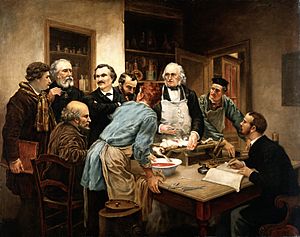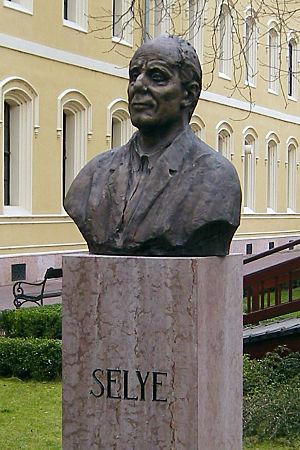Psychoneuroimmunology facts for kids
Psychoneuroimmunology (PNI) is the study of the interaction between psychological processes and the nervous and immune systems of the human body. PNI takes an interdisciplinary approach.
The main interests of PNI are the interactions between the nervous and immune systems and the relationships between mental processes and health.
History
Interest in the relationship between psychiatric syndromes or symptoms and immune function has been a consistent theme since the beginning of modern medicine.
Claude Bernard, a French physiologist, founded the concept milieu interieur in the mid 1800s. In 1865, Bernard described the perturbation of this internal state “… there are protective functions of organic elements holding living materials in reserve and maintaining without interruption humidity, heat and other conditions indispensable to vital activity. Sickness and death are only a dislocation or perturbation of that mechanism." (Bernard, 1865)
Walter Cannon, a professor of physiology at Harvard University coined the term homeostasis in his book The Wisdom of the Body in 1932. In his work with animals Cannon observed that any change of emotional state in the beast, such as anxiety, distress, or rage was accompanied by total cessation of movements of the stomach (Bodily Changes in Pain, Hunger, Fear and Rage, 1915). These studies into the relationship between the effects of emotions and perceptions on the autonomic nervous system, the responses that led to the freeze, fight or flight response.
Birth of psychoneuroimmunology
In 1975 Robert Ader and Nicholas Cohen advanced PNI with a demonstration of classic conditioning of the immune function, and coined the term "psychoneuroimmunology". Ader was investigating how long conditioned responses might last in laboratory rats. The highly reproducible results showed that conditioned rats exposed to the conditioned stimulus were immuno suppressed. In other words, a signal via the nervous system (taste) was affecting immune function. This was one of the first scientific experiments that demonstrated that the nervous system can affect the immune system.
In 1981 David Felten, then working at the Indiana University of Medicine, discovered a network of nerves leading to blood vessels as well as cells of the immune system. The researchers also found nerves in the thymus and spleen terminating near clusters of lymphocytes, macrophages and mast cells, all of which help control immune function. This discovery provided one of the first indications of how neuro-immune interaction occurs.
Ader, Cohen and Felten went on to edit the groundbreaking book Psychoneuroimmunology in 1981, which laid out the underlying premise that the brain and immune system represent a single, integrated system of defense.
Link between stress and disease
Stressors can produce profound health consequences. In one epidemiological study, for example, all-cause mortality increased in the month following a severe stressor – the death of a spouse. Theorists propose that stressful events trigger cognitive and affective responses which, in turn, induce sympathetic nervous system and endocrine changes. These ultimately impair immune function. Potential health consequences are broad, but include rates of infection, HIV progression, and cancer incidence and progression.
See also
 In Spanish: Psiconeuroinmunología para niños
In Spanish: Psiconeuroinmunología para niños



